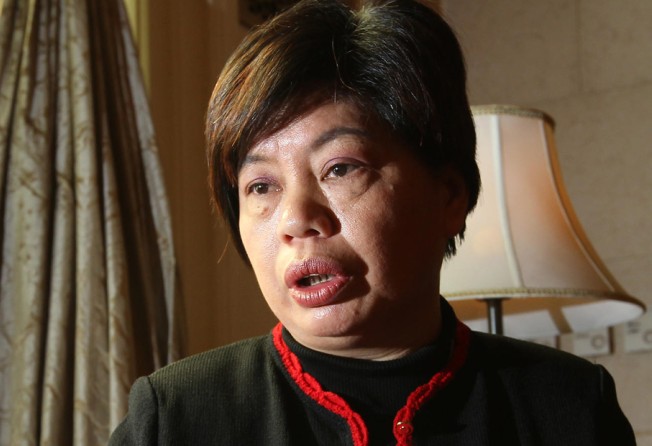Pauline Ngan backs Po Leung Kuk's plans to open schools in China
A modern woman who left village traditions behind says Hong Kong-style schools on the mainland would help keep families together

Pauline Ngan Po-ling, the former chairwoman of Po Leung Kuk and a mother of two boys, supports the charity's desire to run Hong Kong-style kindergartens and schools on the mainland to ease the need for schools for cross-border pupils and children born in Hong Kong to mainland parents.
Ngan was born in a village in southern Fujian , where women were expected to be domestic and traditional. Her unconventional personality was a right match for China's opening-up and Hong Kong's free economy when she arrived in the city in 1980. Today she is deputy chairwoman of one of the world's largest hat makers, Mainland Headwear, and a Hong Kong delegate to the National People's Congress.
What unique educational problems do the Hong Kong-born children of mainlanders face?
Some mainland parents plan to leave their Hong Kong-born children in the SAR with relatives and friends to enjoy local compulsory education. As a mother, I realise that can cause great harm to children's physical and mental development. The best way to solve the problem is, first, to allow those children to live with their parents and to provide them with the Hong Kong model education simultaneously. Po Leung Kuk is interested in running preschools in Shenzhen.
Is it possible for Po Leung Kuk to run kindergartens or Hong Kong model schools on the mainland?
In 2004, Po Leung Kuk proposed to run Hong Kong model schools in Shenzhen for Hong Kong children, whose parents work on the mainland, but the plan was suspended as many schools near the northern New Territories were shut due to insufficient intakes because of the city's past low birth rate. Now the situation has reversed as ever more Hong Kong-born mainland children flow over the border to seek schools. Po Leung Kuk is a very experienced charity and educational organisation. We do not need direct funding from the Hong Kong government, just [a permit for] the kindergarten vouchers it issues to Hong Kong parents to be used in [our schools in] Shenzhen.
Why doesn't it cover preschool vouchers?
The Hong Kong government banned mainland parents from giving birth to children in Hong Kong last year. So the number of such children is decreasing.
So why does the charity still push for opening schools on the mainland?
It is a long-term educational project that will help the integration of Hong Kong and Guangdong. Home prices in Hong Kong are soaring. More and more Hong Kong people have chosen to settle down in Shenzhen, especially men married to mainland women. Education is the biggest headache for those couples when they have children. Po Leung Kuk schools have created a brand name. I believe if our government supports Po Leung Kuk, it will encourage more young people to work and live on the mainland.
You once said Hong Kong has not done enough to promote gender equality. Please explain.
Women make up 54 per cent of the population, yet the Hong Kong government never gives us power as stakeholders. All women in the world need three things: status, stability and money. But our government has failed to fulfil that. For example, there are no seats for a women's subsector on our Election Committee. Hong Kong's Women's Commission was established in January 2001, while the UN Commission on the Status of Women was set up in 1946. In the first year, the Hong Kong Women's Commission was supervised by the Food and Health Bureau, and then it was passed to other departments. Now it's under the Labour and Welfare Bureau. I hope Chief Executive Leung Chun-ying can provide more support for women's organisations. C.Y. knows Hong Kong women's important role ... key members of his campaign office are women from the elite.
What made you refuse to follow the path of a traditional housewife in your Fujian village?
Yes, I am not a qualified traditional Minnan woman as I don't want to stay at home as a housewife. That's why I seldom appear at any Fujian community gatherings because I know I am persona non grata in that male-dominated circle. I do what I love ... I have a persevering character driving me to pursue my ambitions.
But you've also said you owe your success to two men. Who are they?
The first one is my father. I was an educated youth and spent several years working in rural areas during the Cultural Revolution. When I moved to Hong Kong in 1980, my father didn't let me work, but wanted me to take full-time English courses for 21/2 years, which totally changed my life. English knowledge has helped me to expand my business overseas.
The other man is my husband, Ngan Hei-keung. He was a scholar in my hometown and was my private tutor when I was preparing for university entrance exams. I failed that, but we felt in love. We kept our relationship after I moved to Hong Kong. But my father set a tough condition: I could only marry [Ngan] when he became a Hong Kong citizen. The quickest way to help him get a one-way permit to Hong Kong was if I married him first, then we secretly got a marriage certificate in my hometown. After four years apart, we finally reunited in Hong Kong and had our formal wedding party in 1984.
Pauline Ngan spoke to Minnie Chan